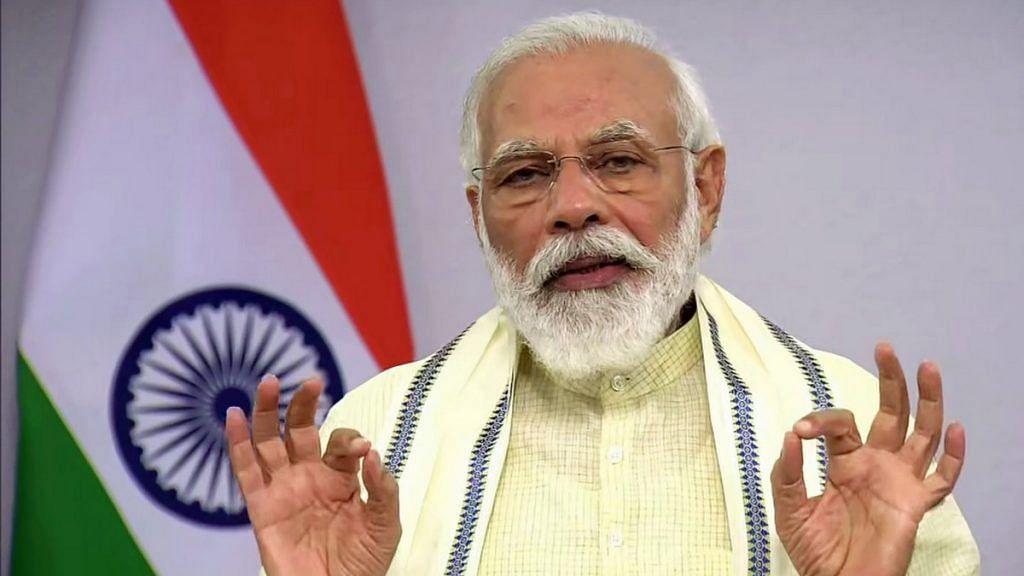New Delhi: Prime Minister Narendra Modi, in not responding to the India-China border situation under pressure from critics or public opinion, is displaying statesmanship, because anybody who fires a shot under pressure takes completely unnecessary risks, ThePrint’s Editor-in-Chief Shekhar Gupta said in episode 510 of Cut The Clutter.
In a short address to the nation Tuesday evening, PM Modi spoke about the guidelines for ‘Unlock 2.0’. He shocked and even disappointed many people by not addressing the stand-off with China in his speech.
But a strategic decision of that nature is not a T20 match, it’s a five-day Test match, where everything has to be decided very carefully. That cannot happen if a leader is responding to public pressure, Gupta said.
This is a much bigger problem in these times of populism, when so many countries are being run by very powerful single-man governments, who are alpha-male populists. Their decisions are often based in a need to show how powerful and decisive they are, but any leader who takes important decisions under that pressure suffers, Gupta said.
Lessons from the leadership of Jawaharlal Nehru are important to keep in mind here. In 1962, Nehru’s decision to go to war with China — at a time when he knew the Indian Army wasn’t ready — was made under heavy public pressure. Nehru’s decision was made out of exasperation, because he was so completely harassed by his critics to go to war. While he was very much a one-man, personality-driven army, he did let the criticism get under his skin.
Also read: Modi skips Eid in the line-up of Indian festivals. Act of omission or commission?
Cuban missile crisis
The same year as when Nehru decided to go to war with China, the United States was facing the threat of Soviet Union’s missiles. But then-US president John F. Kennedy’s response to the threat tells you that very often it is more prudent for leaders not to decide when under pressure — either of public criticism or public adulation.
On 15 October 1962, US intelligence got evidence that the Soviet Union was planting nuclear missiles in Cuba. This was 800 miles from the American coast, and those missiles would have had almost all parts of the US in its range. The news caused great alarm and the US defence forces wanted immediate, massive military strikes to take over Cuba. That may also be the immediate inclination of any leader — to be decisive and just go for it.
But Kennedy, who was still not a very experienced president, did not lose his nerve. He did not decide in a hurry. It is then that he is supposed to have spoken the famous line: A good leader does not have to decide every time.
Similarly, former Indian PM Indira Gandhi was under immense pressure to act against Pakistan when on 25 March 1971, the Pakistani army cracked down on East Pakistan. But she knew that India wasn’t ready. So Mrs Gandhi waited almost a full nine months, and used that time to prepare India militarily, as well as diplomatically and strategically. The war finally began on 3 December and it took India barely 13 days to register a win.
Also read: Modi’s rajniti unable to tackle India’s three big crises. Time for lokniti
Demonetisation and lockdown
PM Modi’s demonetisation in 2016 was a result of ‘one-man-think’ — where one man thinks and decides. There is no openness of debate or discussion. It was his decision, taken under the advice of some pop-economists. But no idea of this scale can go up for implementation unless it has gone through the usual rounds of scepticism and doubt.
But this happened because of the current obsession with shock and awe.
Similarly, the first lockdown was another such decision taken, with no thought given to what happens to migrants in the cities. The boss thinks of an idea, and everyone starts to retweet it, calling it a masterstroke instead of debating it.
So, by not reacting to the India-China standoff under a pressure, PM Modi is now avoiding that temptation.
Also read: Why can’t China retaliate to Modi’s virtual strike? There is no Indian TikTok to be punished
